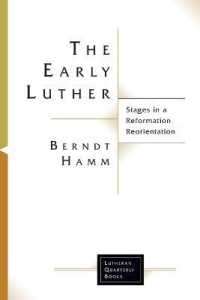- ホーム
- > 洋書
- > 英文書
- > Religion / Ethics
Full Description
There are reflections of Plotinus' philosophy in the existential dialectic of Søren Kierkegaard: in both, there is a form of truth that is unknown by reason and yet known by faith.
This book challenges the traditional view that Kierkegaard is not a systematic philosopher. Although Johannes Climacus articulates Kierkegaard's rejection of Hegel's systematic philosophy, Kierkegaard also praises the metaphysical structure and content of certain ancient philosophers. Because Kierkegaard ultimately takes a leap of faith beyond the realm of reason, his philosophy is closer to Plotinus' philosophy than it is to Plato's. Kierkegaard (1813-1855) and Plotinus (205-270AD) share a set of "existential structures" that have to do with the nature of the self and reality. Kierkegaard, like Plotinus, uses several literary tools for a twofold paradoxical reason; his literary style both disguises the systematic nature of his work and reveals the edifying nature of his philosophy. The tools that Kierkegaard uses include his use of pseudonymous authors, sarcasm, paradox, irony and humour. Plotinus, whilst communicating directly, uses irony, metaphors, myths, and paradoxes to convey his metaphysical concepts.
Kierkegaard and Plotinus also both have edifying goals, as they seek to inspire their readers to authentic selfhood. They are both grounded in a descent from the absolute and point towards an ascent; they distinguish between the ascent to the ethical-religious realm where the divine principles can be contemplated, and to a higher and final ascent to the absolute principle. They both also count as existentialists, and therefore it is Plotinus who deserves the title of "first existentialist." The metaphysical framework that the two authors share is intended to lead, purify, and elevate the individual, systematically, to the highest spiritual level. For both, metaphysics should be edifying.
Contents
Acknowledgements
Abbreviations
Introduction
Chapter 1. The Metaphysical Dilemma
Chapter 2. Socrates as the Personification of Infinite Negativity
Chapter 3. A Solution to the Metaphysical Dilemma
Chapter 4. Kierkegaard and Plotinus: A Leap Beyond the Metaphysics of Plato
Chapter 5. Kierkegaard and Plotinus: The Movement from Recollection to Repetition
Chapter 6. Kierkegaard and Plotinus: The Philosophy of Self
Chapter 7. Kierkegaard and Plotinus: The Truth of Subjectivity
Chapter 8. Plotinus: The Three Phases of the Soul
Chapter 9. Kierkegaard: Three Psychological Levels of Existence
Conclusion: Reflections of Plotinus' Metaphysics in Kierkegaard's Existential Philosophy
Bibliography
Index








